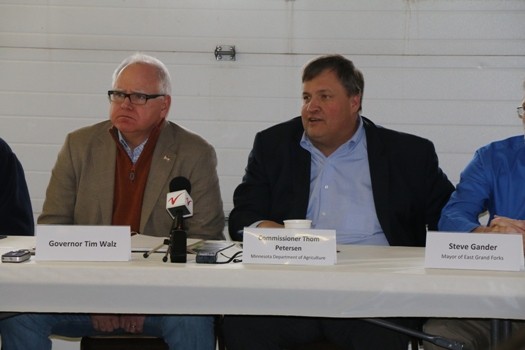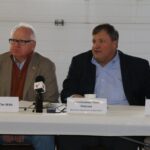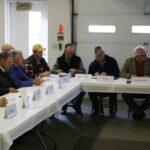Governor Tim Walz visited East Grand Forks on Tuesday to meet with local growers about the widespread economic concerns regarding the harvesting and transportation of crops that have been affected by the recent weather. Walz was joined by at the table by State Senators Mark Johnson and Kent Eken, State Representatives Deb Kiel and Dan Fabian, along with Joe Martin of Farm Service Agency, and Joe Kelly of Homeland Security Emergency Management. Members of the Minnesota Associations for Wheat, Potatoes, Soybean, and Corn Growers, the Red River Valley Sugarbeet growers, and American Crystal were in attendance along with staff from the offices of Collin Peterson, Amy Klobuchar, and Tina Smith.
Walz stressed throughout the meeting that he was present to listen and to find ways to relieve the pressure in northwest Minnesota. Walz said it is his job to make a case for northwestern Minnesota, adding that he doesn’t think people know the stresses that are going on in the region and that it runs much deeper than economics. He said it was eye-opening to see how wet it was and the damage from an airplane. Those in attendance shared their concerns, and many were concerned with the hours of service for getting propane to dry their crops. Casey Folson also shared with Walz that only about 40 percent of the yellow and red fresh potatoes have been harvested on the Minnesota side of the river. And that the current forecast, which calls for freezing temperatures, could ruin the rest of the crop by next week, if not within the next night or two. Seed potatoes are also struggling with many producers not having enough to sell beyond as they will need all they harvested thus far for their fields next year. Folson also talked about the trickledown effect with haulers not getting paid because there aren’t potatoes or other crops getting hauled out of the valley because they are still in fields.
Rhonda Larson, Minnesota Wheat Growers Association, talked about the low falling wheat that has been produced because of the weather coupled with falling prices. Larson said that a recent crop payment was reduced by about $16,000 because the weather has negatively affected the falling number. It was also a common theme that the struggles are especially hard on young farmers with Larson sharing that her son the last four years has had to live off what he makes during the winter moving snow because the crops aren’t generating profit. Matt Krueger also said it’s difficult for young farmers like himself to get help because while they’re in good standing with banks, they don’t qualify for guaranteed loans. At the same time, their standing is too high to be eligible with the Farm Service Agency.
Another topic brought up was law enforcement with Johnson suggesting that some of the frustration producers were feeling was that conventional vehicles need reasonable suspicion to be pulled over and that one way to expedite the harvest could be to apply that process to the trucks. Colonel Matt Langer, Minnesota State Patrol, said they are working hard to find that right balance between safety and helping ensure producers can get their crops in. He said the right balance is almost impossible to find in the current situation, adding that inspections the past couple of days had picked up several trucks severely overweight, one truck driver that was drinking, and one with a canceled license. Langer also said they empathize with the producers trying to get the crops in and are trying to work with producers to get them the overweight permits when they can rather than ticket them during this harvest, among other measures they are attempting to take.
Governor Walz asked American Crystal Sugar President and CEO Tom Astrup about the Sugarbeet harvest. Astrup told him about 60 percent of the crop had been harvested overall but that from Crookston and East Grand Forks south through Hillsboro, there are many producers with only 40 to 45 percent harvested and still others that have only been able to harvest 15 to 20 percent. Walz also repeatedly asked people if they’d ever seen anything like this year. And Astrup said to be 60 percent complete at this late was unprecedented, a sentiment which was echoed by growers regarding the harvest of all crops.
Joe Kelly from Homeland Security explained that the types of disaster declarations his office deals with for presidential declarations are based mostly on infrastructure losses and that currently, very few losses had been reported to Minnesota’s infrastructure. He said that meant a secretarial disaster declaration by U.S. Department of Agriculture (USDA) Secretary Sonny Perdue was more likely. Kelly also explained that North Dakota’s threshold for asking for a presidential disaster declaration on infrastructure damage is $1 million, while Minnesota’s is $8 million. Joe Martin from Farm Service Agency said that those declarations are made for each crop on a county by county basis where at least 30 percent of the crop was lost. Governor Walz said he had talked with the staff at USDA about secretarial declarations and was assured that once the numbers on lost crops came in, the secretary would share them with the president.
In the meantime, Walz said the state would be working on short-term solutions to support growers in the region based on what they heard at the meeting. He added that included using the state’s emergency fund for these types of losses and that some of the steps could be accomplished this week. “Some of them are like hours of service on propane hauling,” said Walz. “I think I’d like to get some action talked about this week potentially. We’ve talked about that before to make sure that we’re able to get that propane out for drying. Taking a look to see if there are ways that we can speed these permits on folks who need these permits for the overweight. Making sure we’re unified across counties and the state. Making sure the State Patrol is striking that proper balance keeping our roads safe, but also understanding that we’re in a unique situation and can we maybe help folks get these things faster without causing a safety issue. I think those are short-term. We’re assessing crop damage and property damage to look for disaster declarations. We probably won’t reach the threshold for a major presidential disaster declaration, but a secretarial declaration on the loss of crops by county is much more of a potential. And then the state’s emergency fund for these types of losses, to pursue that. I think we have some short-term things. Some of these things we’re talking about this week. Some will be a little longer, and we know everyday matters.”
Mark Johnson said that it was important for the Governor and people with authority to make decisions to find ways for the state to help. “It was good to have the governor up here, and he responded,” said Johnson. “He brought a lot of folks up here that have the authority to make decisions. We’re all struggling to find ways for the state to work here and help in this situation. The problem is it’s not necessarily physical damage to infrastructure and things the state would normally be responsible for, but it’s the damaging of these crops and things like that. We have to figure out ways that we can make resources available to our agricultural producers to make sure the damage and things that happened to their crops that somehow, we can keep them going for next year. It was helpful to have these folks up here who knew what was going on, knew the programs, and are working together to address these concerns.”
Deb Kiel said it was important not only that the governor saw what was going on himself, but that producers in attendance got to hear from him as well. “I’m very thankful that the governor came,” said Kiel. “Seeing the damage from the plane was important. It’s hard to describe it without seeing the damage. And having the growers that were here see what the governor had to say is very important. He is paying attention. I’m very thankful for Commissioner Thom Peterson. He has been very helpful all the time, understands agriculture, and is making sure that all of the crops here have some notice and attention for what we need to do.”








